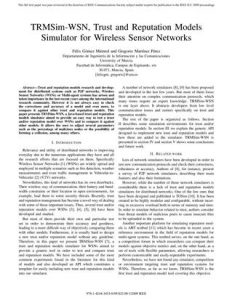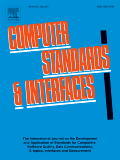Different trust and/or reputation models have arisen in the last few years. All of them have certain key processes in common such as scoring, ranking, rewarding, punishing or gathering behavioral information. However, there is not a standardization effort for these kinds of models. Such effort would be beneficial for distributed systems such as P2P, ad-hoc networks, multi-agent systems or Wireless Sensor Networks. In this paper we present a pre-standardization approach for trust and/or reputation models in distributed systems. A wide review of them has been carried out, extracting common properties and providing some pre-standardization recommendations. A global comparison has been done for the most relevant models against these conditions, and an interface proposal for trust and/or reputation models has been proposed.
Towards pre-standardization of trust and reputation models for distributed and heterogeneous systems
Abstract
Related Publications

TRMSim-WSN, Trust and Reputation Models Simulator for Wireless Sensor Networks
Conference
IEEE International Conference on Communications (IEEE ICC 2009), Communication and Information Systems Security Symposium, ISBN: 978-1-4244-3435-0, Dresden, Germany
Publication year: 2009
Co-Authors
This work would not have been possible without the inestimable contribution of:
- Gregorio Martínez Pérez

Citation
Félix Gómez Mármol, Gregorio Martínez Pérez, «Towards pre-standardization of trust and reputation models for distributed and heterogeneous systems«, Computer Standards & Interfaces, vol. 32, no. 4, pp. 185-196, 2010
Journal Ranking & Impact Factor
- Journal: Computer Standards & Interfaces
- Category: Computer Science, Software Engineering
- Rank: 55/99
- Quartile: Q3
- Impact Factor: 0.868


